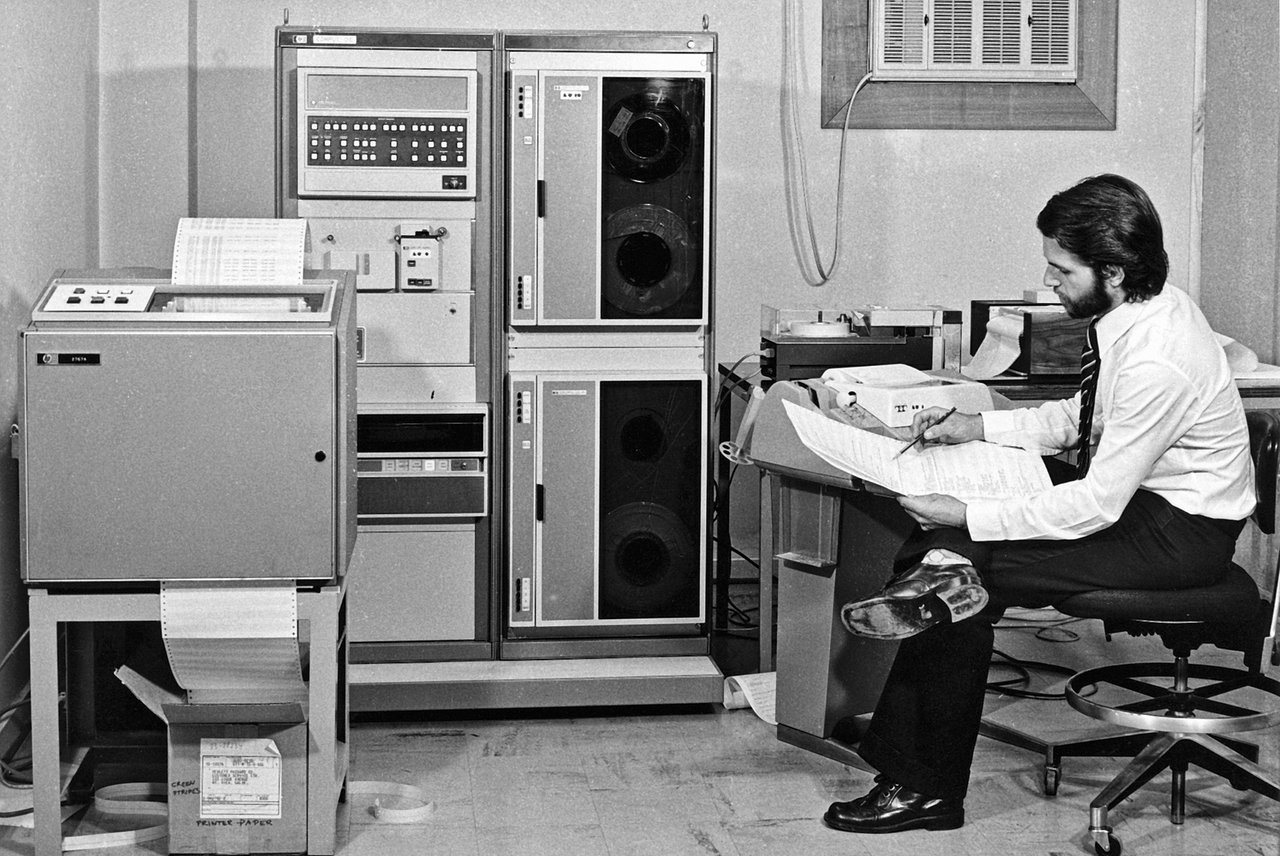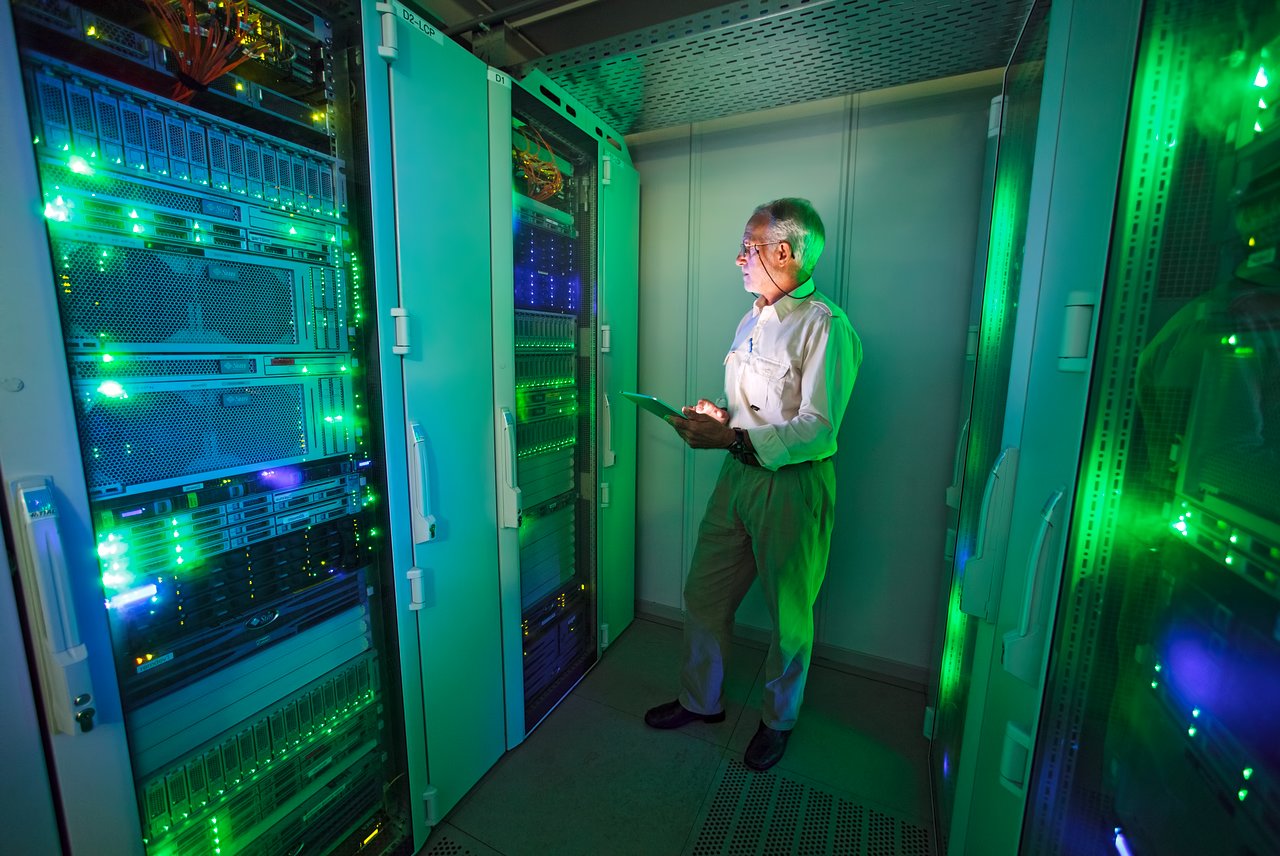La informática en ESO a través del tiempo — El impresionante avance de la tecnología


ESO cumple cincuenta años, y para celebrar este importante aniversario, les mostramos retazos de nuestra historia. Una vez al mes, durante el año 2012, un especial “Ayer y hoy” de la Imagen de la Semana, mostrará cómo han cambiado las cosas a lo largo de las últimas décadas en los observatorios de La Silla y Paranal, en las oficinas de ESO en Santiago de Chile, y en la Sede Central en Garching (Munich, Alemania).
Nuestro par de fotografías de este mes muestran cómo el poder de la informática utilizado por ESO ha cambiado drásticamente con el paso del tiempo. Ambas imágenes muestran al astrónomo austriaco Rudi Albrecht frente a un sistema informático de ESO, pero en fechas separadas por décadas.
En la imagen histórica, tomada en 1974 en las oficinas de ESO en Santiago (Chile), podemos ver a Albrecht, lápiz en mano, estudiando códigos detenidamente frente a un teletipo. Trabajaba en el software para el instrumento “Spectrum Scanner”, instalado en el Telescopio de 1 metro de ESO [1], en el Observatorio de La Silla. Los datos eran procesados en Santiago utilizando el miniordenador Hewlett Packard 2116 que puede verse tras la impresora. Esta voluminosa computadora, con un procesador y una impresionante memoria de núcleo magnético de 16 kilobytes (!), almacenaba los resultados en una cinta magnética, datos que ya estaban preparados para su posterior procesado por parte de los astrónomos visitantes en las computadoras de sus respectivos centros de investigación. Para manejar archivos de una cinta que fueran mayores que la memoria disponible, Albrecht desarrolló un sistema de memoria virtual, aportándolo al Hewlett Packard Software Center.
La fotografía actual muestra a Albrecht en el Centro de Datos de la Sede Central de ESO en Garching (Munich, Alemania), que archiva y distribuye datos de los telescopios de ESO. Está frente a un estante o “rack” que contiene un sistema con cuarenta núcleos de procesamiento, 138 terabytes de capacidad de almacenamiento y 83 gigabytes de memoria RAM — ¡más de cinco millones de veces más que la máquina que utilizaba en 1974! Incluso el ordenador portátil o “tablet” que tiene entre las manos supera con creces a la vieja máquina y proporciona una moderna alternativa al lápiz y el papel.
A lo largo de los años, los sistemas informáticos de ESO se han desarrollado para manejar el flujo de datos científicos de los telescopios ubicados en los observatorios. Los avances en telescopios, detectores, y tecnología informática se traducen en que, ahora, los observatorios producen cantidades masivas de imágenes, espectros y catálogos. Por ejemplo, los dos telescopios de sondeo de Paranal, VST y VISTA, producen juntos más de 100 terabytes de datos por año. ¡A años luz de los días de las cintas magnéticas y las memorias de 16 kilobytes!
Notas
[1] El telescopio de 1 metro de ESO fue desmantelado en 1994.
Crédito
ESO
Sobre la Comparación de la Imagen
| Identificador: | potw1223a |
| Fecha de publicación: | 4 de Junio de 2012 a las 10:00 |
Imágenes
Our use of Cookies
We use cookies that are essential for accessing our websites and using our services. We also use cookies to analyse, measure and improve our websites’ performance, to enable content sharing via social media and to display media content hosted on third-party platforms.
ESO Cookies Policy
The European Organisation for Astronomical Research in the Southern Hemisphere (ESO) is the pre-eminent intergovernmental science and technology organisation in astronomy. It carries out an ambitious programme focused on the design, construction and operation of powerful ground-based observing facilities for astronomy.
This Cookies Policy is intended to provide clarity by outlining the cookies used on the ESO public websites, their functions, the options you have for controlling them, and the ways you can contact us for additional details.
What are cookies?
Cookies are small pieces of data stored on your device by websites you visit. They serve various purposes, such as remembering login credentials and preferences and enhance your browsing experience.
Categories of cookies we use
Essential cookies (always active): These cookies are strictly necessary for the proper functioning of our website. Without these cookies, the website cannot operate correctly, and certain services, such as logging in or accessing secure areas, may not be available; because they are essential for the website’s operation, they cannot be disabled.
Functional Cookies: These cookies enhance your browsing experience by enabling additional features and personalization, such as remembering your preferences and settings. While not strictly necessary for the website to function, they improve usability and convenience; these cookies are only placed if you provide your consent.
Analytics cookies: These cookies collect information about how visitors interact with our website, such as which pages are visited most often and how users navigate the site. This data helps us improve website performance, optimize content, and enhance the user experience; these cookies are only placed if you provide your consent. We use the following analytics cookies.
Matomo Cookies:
This website uses Matomo (formerly Piwik), an open source software which enables the statistical analysis of website visits. Matomo uses cookies (text files) which are saved on your computer and which allow us to analyze how you use our website. The website user information generated by the cookies will only be saved on the servers of our IT Department. We use this information to analyze www.eso.org visits and to prepare reports on website activities. These data will not be disclosed to third parties.
On behalf of ESO, Matomo will use this information for the purpose of evaluating your use of the website, compiling reports on website activity and providing other services relating to website activity and internet usage.
Matomo cookies settings:
Additional Third-party cookies on ESO websites: some of our pages display content from external providers, e.g. YouTube.
Such third-party services are outside of ESO control and may, at any time, change their terms of service, use of cookies, etc.
YouTube: Some videos on the ESO website are embedded from ESO’s official YouTube channel. We have enabled YouTube’s privacy-enhanced mode, meaning that no cookies are set unless the user actively clicks on the video to play it. Additionally, in this mode, YouTube does not store any personally identifiable cookie data for embedded video playbacks. For more details, please refer to YouTube’s embedding videos information page.
Cookies can also be classified based on the following elements.
Regarding the domain, there are:
- First-party cookies, set by the website you are currently visiting. They are stored by the same domain that you are browsing and are used to enhance your experience on that site;
- Third-party cookies, set by a domain other than the one you are currently visiting.
As for their duration, cookies can be:
- Browser-session cookies, which are deleted when the user closes the browser;
- Stored cookies, which stay on the user's device for a predetermined period of time.
How to manage cookies
Cookie settings: You can modify your cookie choices for the ESO webpages at any time by clicking on the link Cookie settings at the bottom of any page.
In your browser: If you wish to delete cookies or instruct your browser to delete or block cookies by default, please visit the help pages of your browser:
Please be aware that if you delete or decline cookies, certain functionalities of our website may be not be available and your browsing experience may be affected.
You can set most browsers to prevent any cookies being placed on your device, but you may then have to manually adjust some preferences every time you visit a site/page. And some services and functionalities may not work properly at all (e.g. profile logging-in, shop check out).
Updates to the ESO Cookies Policy
The ESO Cookies Policy may be subject to future updates, which will be made available on this page.
Additional information
For any queries related to cookies, please contact: pdprATesoDOTorg.
As ESO public webpages are managed by our Department of Communication, your questions will be dealt with the support of the said Department.

